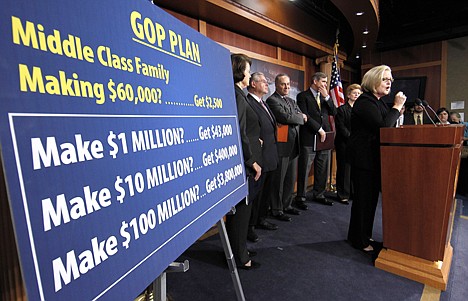Republicans seize on unemployment rate hike
WASHINGTON - With unemployment rising, incoming House Speaker John Boehner vowed Friday that Republicans will show the way toward extending tax cuts in 2011 if the outgoing Democrats fail to do it sooner.
Boehner, R-Ohio, made his comment as partisan wrangling in the Senate slowed attempts to pass legislation ensuring that tax cuts enacted in 2001 and 2003 don't expire.
The White House has signaled that President Barack Obama is prepared to sign a bill extending tax cuts at all levels, as Republicans want. At the same time, Democrats want the bill to include an extension of unemployment benefits for the long-term unemployed, renewal of tax provisions benefiting college students, companies that hire the jobless and lower- and middle-income workers, even if they don't make enough to pay federal taxes.
Additionally, private talks include a possible increase in the debt limit to permit the Treasury to borrow funds needed to meet its obligations.
But Senate Democrats, who propose allowing tax cuts to lapse for the upper income, accused Republicans of favoring millionaires and billionaires at the expense of the middle class.
At a news conference, Sen. Claire McCaskill, D-Mo., directed her remarks to tea party-aligned voters who sided with the GOP this fall. Republicans "are not concerned about the people in the tea party," she said. "They're worried about people who can't decide which home to go to" for the holidays.
Sen. Robert Menendez, D-N.J., likened negotiations with Republicans over tax cuts to dealing with hostage takers. "It's almost like the question, 'Do you negotiate with terrorists?'" he said.
A pair of Senate test votes is scheduled for Saturday. But gridlock is the likely outcome, leaving the issue unresolved until next week.
Boehner blamed President Barack Obama's economic stimulus package and Democratic tax policies for the high unemployment rate, which rose to 9.8 percent in the government's latest monthly report issued earlier in the day.
"The lame-duck Congress should do the right thing and vote immediately to cut spending and stop all the tax hikes," he said in a written statement. "If they don't, the new House majority will in January."
In fact, a deal to extend expiring tax cuts for all taxpayers is starting to take shape, although it is not clear how quickly it might come together given opposition from some congressional Democrats to make it apply to the upper income.
At the same time, the White House is seeking to expand the tax package to include other measures designed to boost the nation's sluggish economy.
Among them are extending jobless benefits for millions of unemployed workers and continuing tax breaks that were part of President Barack Obama's massive economic recovery package enacted last year.
Without action by Congress, unemployment benefits will run out this month for 2 million people, and several million more will lose them later in the winter.
Earlier Democratic efforts to extend the program into 2011 have been blocked by Republicans demanding offsetting spending cuts.
In addition, Democrats are seeking to extend Obama's Making Work Pay tax credit, which provides tax credits of up to $400 for individuals and $800 for married couples. The tax credit was enacted last year and expires in January.
Democrats also want to extend two other measures: a tuition tax break for college students and a cut for businesses that hire the unemployed.
Sweeping income tax cuts enacted earlier in the decade under President George W. Bush are to expire at the end of the year. If Congress does not act, taxpayers at every income level would be hit with a significant tax increase.
Obama and Democratic leaders in Congress want to extend the tax cuts only for individuals making less than $200,000 and married couples making less than $250,000.
Republicans and some rank-and-file Democrats want to extend the tax cuts for everyone.
The White House left open the door for a compromise to extend all the tax cuts for up to three years. Senate Republican leader Mitch McConnell says he's willing to consider the idea.
Senate Democrats, however, want to publicly stake out their position before agreeing to any compromise, much like their counterparts in the House did Thursday.
The House passed a bill Thursday that would extend middle class tax cuts while letting tax cuts for the wealthy expire. Sen. Max Baucus, D-Mont., introduced a similar bill Thursday evening.
"My view is, it's important to pass middle-income tax cuts," Baucus said. "That's very important and we should do it."
Senate Majority Leader Harry Reid scheduled votes on Saturday on two Democratic proposals: one by Baucus and another by Sen. Chuck Schumer, D-N.Y. Baucus' bill would extend tax cuts for individuals making less than $200,000 and married couples making less than $250,000. Schumer's bill would extend tax cuts for families making less than $1 million.
Neither bill is expected to pass the Senate because Democrats need Republican support to pass a tax bill.

